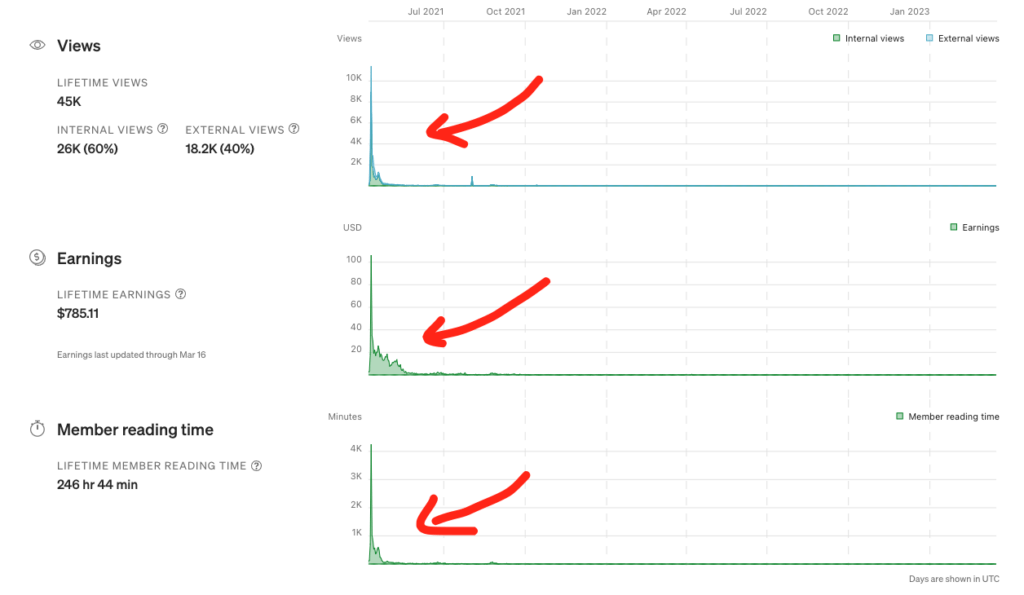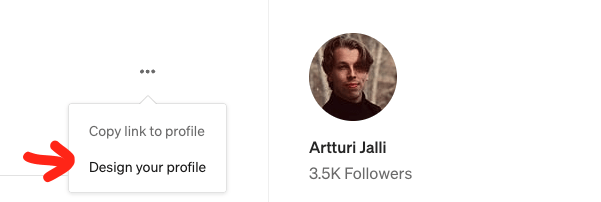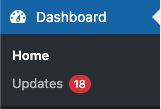Medium is one of the most popular blogging platforms with a great built-in audience, an easy-to-use blog editor, and a lucrative partner program.
👉 Join my Free Medium Course to learn how to grow your followers, reads, and earn more.
Choosing between blogging on Medium vs starting a personal blog can be tricky, though.
- On Medium.com, you might gain rapid success. But unless you keep pushing, the success will drain equally as quickly.
- On your own blog, you can slowly build long-lasting success. This doesn’t go away even if you don’t write for a while.
This is a complete guide that explores the pros and cons of each option.
Watch my video about the topic instead?
To put it short, if you’ve never blogged before and aren’t sure if you want to do it full-time, try Medium first.
But if you want to start a successful and scalable online business, starting your own blog is the only way to go.
Anyway, let’s jump into it.
Medium
| Pros | Cons |
|---|---|
| Easy to use | Medium owns your content |
| Monetization through partner program | Medium doesn’t care about you |
| Big built-in audience | Limitations and restrictions |
| SEO advantage | Restrictions on affiliate marketing |
Medium is a popular blogging platform with tens of thousands of authors and over 100M monthly visitors.
Medium.com is a great place for beginner bloggers to test out the blogging game. Instead of having to purchase a domain and set up a website, you can just sign up and start writing. This makes the entry to blogging smooth and easy for beginners.
Let’s take a look at some of the pros and cons associated with Medium blogs.
Pros
1. Easy to Use
Medium is easy to get started with.
All you need to do is sign up and start writing blog posts. It literally takes less than a couple of minutes before you’re writing your first post.
Not only is it easy to get started on Medium, but it’s also easy to use. The Medium blog post editor is simple and intuitive. It comes with all the necessities of a blogging platform, yet there are only 5-10 features and options you ever need to touch.
2. Earn Money
Medium has a partner program that you can join once you hit 100 followers and publish at least one post.
The partner program pays based on reading time. If a member reads your story, you earn a portion of their monthly membership fee.
To simplify, if a member reads 100 stories in a month and one of them is yours, you earn 1% of the portion of the fee Medium pays out.
In my experience, 1 story view is worth about $0.01-$0.02. This obviously depends on the reading time and other factors.
Make sure to read: How to Make Money on Medium
3. Built-In Audience
Medium is the most popular blogging platform that attracts tens of millions of monthly visitors.
On Medium, there are publications, that is, spaces where a group of people shares a common interest.
For example, Better Programming is a popular Medium publication with 200k+ followers all interested in coding.
When you publish stories in publications, you expose them to a big group of people that are already interested in the topic.
Just remember that you need to apply for publications. Also, not all stories get accepted.
4. “SEO Advantage”
Medium is stronger in the eyes of Google because of its reputation. This helps you rank posts higher more easily.
This is an “SEO advantage” that comes with a popular site like Medium.com.
Assuming you produce a quality post that solves a problem thoroughly, there’s a chance it ranks high on Google in a matter of days or weeks.
On a brand-new personal blog, this can take months or even a year.
Just remember not to try to use Medium’s high domain authority to your advantage. Nothing can make a bad blog post rank high on search engines. The post needs to be the best!
Make sure to read how to write blog posts that rank high.
Cons
1. Medium Owns You
Medium is a business.
If you write on Medium, you’re essentially working for them.
Medium owns your content. If they wanted to, they could get rid of all your content right now.
One of the reasons I started blogging is to be free and not bound to a company or a tight schedule. While Medium doesn’t require you to stay uberly active, all the posts you write just grow Medium’s own brand and reputation—not yours.
On Medium, people tend to forget the authors and just remember the platform.
This makes sense. When you read a news post or search for information on Google, how many times do you remember the name of the author?
2. Medium Doesn’t Care About You
Medium is a business and you don’t own it.
One day, your successful stories might no longer get visitors because of the algorithm changes.

When I say Medium doesn’t care, I don’t mean it in a bad way. But that’s just the way this business works.
Medium is a business that’s operated by people other than authors. If Medium wants to make a change, they are free to do so—without asking you.
If there’s a publication that Medium doesn’t like, they can close it. If there’s an author Medium doesn’t prefer, they can ban them for life.
If you build a successful business on Medium, it’s just a sub-business owned by Medium. They can take it down at any time.
3. Limitations
Medium is not your own business. You cannot change the platform, code, or rules.
Even though Medium itself is a scalable business, it’s not scalable to you because you cannot make a change.
Of course, you can make some small customizations to your profile and your posts’ outlook. But that’s all you can do.

If you want to take your business to the next level, you cannot do it on Medium. Instead, you need to move out.
4. Affiliate Marketing Restrictions
Medium allows affiliate links—but they’re apparently not a huge fan of those, for sure.
There’s always a concern that Medium won’t accept affiliate links in the future. And this would make sense—Medium won’t earn money through your affiliate links.
If you do excess affiliate marketing, it just hurts Medium’s reputation. Thus, there’s no reason for them to keep your posts live.
Own Blog
| Pros | Cons |
|---|---|
| Full control over everything | Takes a long time to succeed |
| Scalability | More responsibilities |
| Relatively easy to start |
Starting your own personal blog with a custom domain is the right way to go if you want to build a scalable online business.
Although it takes longer time, starting your own blog is the way to go in the long run.
Let’s discuss the pros and cons of starting your own blog.
Pros
1. Full Control
Escaping from your 9-to-5 job is probably one of the key reasons why you started blogging in the first place.
On Medium, this is not possible. Although you don’t work 9-to-5, you still work for them.
But if you start your own site, you’re in full control. No one tells you what you can or cannot do.
2. Scalability
A personal blog is infinitely scalable. It’s your own business. If you want to do affiliate marketing, you can do so. If you want to launch a course, go ahead!
This is not the case when you’re blogging on a platform like Medium. On Medium, you need to work under their restrictions.
3. Easy to Start
On Medium, you can start writing a blog post by just signing up. But it’s not much harder on your own site either.
Traditionally, you’d need to code your site. But these days, website builders exist. Many people use WordPress that’s really easy to set up.
All you need is a domain, web host, and 30-60 minutes of time.
Cons
1. Takes Longer
Unlike on a platform like Medium, you need to start from complete scratch when starting your own personal blog.
This is something that requires a ton of hard work and time. It might take 6-12 months before seeing significant results, especially if you’re not working full-time.
For example, here’s the Google performance for one niche site I operate. In 15 months (8-hour work weeks), it’s getting 200 visitors a day and earns about $1,000/month.

To put it into perspective, this reach is about 5% of the maximum reach in the niche.
So it takes a long time to succeed—even in relatively small niches.
2. Technical Responsibilities
You’re responsible for everything.
Site builders like WordPress.org have a ton of ready-made templates, plugins, and online tutorials. But you still need to do some housekeeping, such as updates and moderation.

At worst, you might even need to touch some code (although there are clear guides on how to do this so that you don’t need to learn to code).
Wrap Up
Medium is a great starting place for new bloggers. Once you have the confidence and patience, you can club up by starting your own blog.
This is what commonly happens (and happened to me as well).
I started on Medium and once I realized the limitations of the platform I moved on to start my own blog. But because Medium is easy to use and has a built-in audience, it can be a great place to test the waters.
